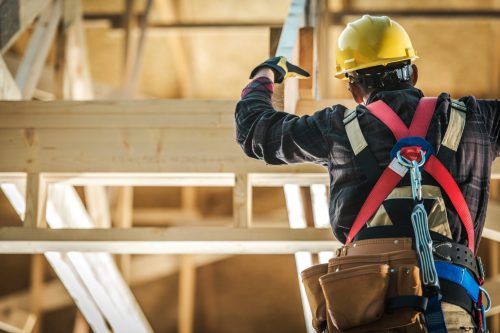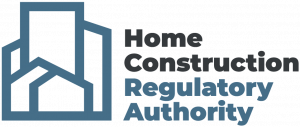Strengthening oversight and safety in Ontario’s new home construction sector
In construction, important decisions often happen before a single shovel hits the ground. Whether you’re designing, building, or inspecting a project, one assumption is clear: the builder knows what they’re doing — and they’re authorized to do it. But that assumption breaks down quickly when proper licensing and oversight aren’t in place.
That’s where the Home Construction Regulatory Authority (HCRA) comes in. Established in 2021, the HCRA is the independent regulatory body responsible for licensing the people and companies who build and sell new homes in Ontario while Tarion – another not-for-profit consumer protection organization established by the Ontario government – administers the province’s new home warranty program.
However, licensing is more than a legal formality. Building new homes requires a high level of expertise — which is why the HCRA mandates that builders demonstrate seven core competencies as part of the licensing process. These range from business and financial planning to project management and knowledge of the Ontario Building Code. Core competencies are required for initial licensing and renewals.
For professionals across Ontario’s residential construction sector, licensing provides a clear and consistent standard — one that supports accountability, mitigates risk, and reinforces public and industry confidence in the homebuilding process.
Illegal building and why enforcement matters
Licensing also provides the legal framework for compliance and enforcement. When builders fail to uphold professional standards and good conduct — whether intentionally or not — the HCRA has a range of tools at its disposal. These include mandatory education, administrative penalties, and in the most serious cases, licence suspensions or revocations.
For example, the HCRA recently issued an immediate licence suspension to a builder who failed to meet the core competencies required to maintain a valid licence — putting homebuyers at risk and undermining the integrity of the sector. While such suspensions are rare, they are an important tool for protecting the public.
While most builders follow the rules, illegal building and selling — the act of constructing or selling new homes without a licence — remains a serious issue and a top priority for the HCRA. These are individuals or companies who knowingly bypass the licensing process. The risks are real: homes may be built without proper Building Code knowledge, financial safeguards, or accountability if something goes wrong. That’s why enforcement matters — and why the HCRA takes proactive steps to investigate and address non-compliance across Ontario.
This spring, the HCRA’s Investigations team conducted site visits in and around Sault Ste. Marie, uncovering multiple instances of illegal building and selling, failures to enrol homes in the warranty program, and breaches of the Code of Ethics — which outlines clear expectations for ethical conduct and is enforced by the HCRA. Site visits were followed by meetings with local building officials — all part of the HCRA’s broader effort to strengthen provincial partnerships and improve detection and deterrence of illegal activity.
To further support compliance, the HCRA also prepares advisories for its licensees. These communications provide practical guidance — including real-world examples of both good conduct and areas of concern. Topics have ranged from handling price escalations and contract terminations to the legal responsibilities associated with selling new homes.
Most recently, the HCRA has been preparing an advisory focused on the legal requirements for new home sales, aimed at clarifying what is expected of sellers to ensure transactions are lawful and transparent. Like other advisories, it is intended to help consumers better understand what they should expect from licensed professionals.
Ontario Builder Directory: Check before you buy
Licensing isn’t just about regulation — it’s also about transparency. Whether you’re a supplier, architect, or part of a municipal team, having access to clear and reliable information about a builder’s record is essential. That’s why the HCRA hosts the Ontario Builder Directory — a free, public tool designed to help users verify whether a builder or seller is licensed before starting work with them.
The Ontario Builder Directory contains licensing information for more than 7,000 builders and sellers across Ontario. It includes details like licence status, years active, number of homes built, and past regulatory actions taken by the HCRA against the builder — including court charges and convictions.
Recent enhancements have made the Builder Directory more transparent and easier to navigate. Regulatory actions are now linked directly from the homepage, and users can search for builders involved in insolvency proceedings — a key risk indicator when evaluating potential builders.
Whether you’re evaluating a new business partner or planning to hire a builder yourself, the Directory delivers essential information — not opinions — to help guide your decisions. It’s one of several tools now featured on the HCRA’s newly launched website, redesigned this spring to make regulatory information easier to navigate and understand.
With improved structure and navigation, the new site offers clearer guidance on the licensing process, builder obligations, and resources to help consumers understand what to expect during the homebuying journey — from reviewing their purchase agreement to knowing what to anticipate before taking possession of their new home. It also features a regularly updated blog and the option to sign up for the HCRA’s newsletter — making it easier for users to stay informed about new consumer resources, events, and enforcement actions taken by the regulator.
Resource hubs for builders and buyers
As part of its new website, the HCRA has launched two centralized Resource Hubs — one technical, and one consumer-focused — to support both industry professionals, homeowners, and those looking to purchase a newly built home.
These Hubs are part of the HCRA’s broader Research & Education Program, which is designed to promote a better understanding of regulatory requirements, strengthen compliance, and support continuous improvement in Ontario’s homebuilding sector. By making relevant, accessible information available in one place, the program helps both builders and consumers navigate a complex regulatory environment with greater confidence.
The Technical Research & Education Hub provides a centralized space for builders and professionals to access educational content on emerging technical trends and best practices in home construction. It features a mix of HCRA-developed resources and curated materials from trusted partners, all designed to help industry professionals stay informed on key regulatory and construction topics. Current focus areas include Ontario Building Code updates, mass timber construction, and summaries of evolving industry trends. To ensure the material remains relevant and credible, the HCRA regularly consults with its Building Research & Collaboration Council — a group of technical experts and stakeholder organizations. Readers are encouraged to bookmark the Hub and check back regularly for new content.
The Consumer Education & Resource Hub, meanwhile, serves as a destination for homeowners and buyers — offering educational content that supports consumer protection, awareness, and informed decision-making throughout the homebuying and homeownership journey. Professionals who field questions from clients or the public can also refer to the Consumer Hub for important topics and key sources of information.
Building confidence through oversight
All the HCRA’s work — licensing, enforcement, education, and access to information — supports a single outcome: greater confidence in the safety, legality, and integrity of Ontario’s homebuilding industry. Regulatory oversight creates a more transparent system, reinforces accountability, and ensures builders are held to consistent standards across the province.
Whether you’re working in design, engineering, construction, or compliance, the regulatory framework matters. The HCRA exists to ensure that builders in this province are qualified, accountable, and operate within the legal and ethical standards expected in a modern housing market.
To learn more or explore the HCRA’s tools and resources, visit hcraontario.ca.
All information listed in this section was submitted by HRCA.
Kenilworth Media Inc. cannot assume responsibility for errors of relevance,
fact or omission. The publisher does not endorse any products featured in this article.





